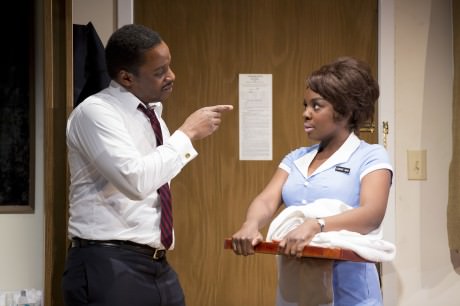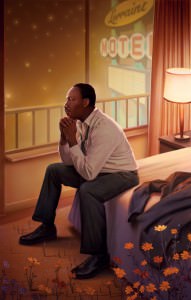From The Mountaintop into the Promised Land
I thought it was really raining behind the motel room on the Kreeger Theater stage. They must have extended the sprinkler system and built a trough to catch the water, I thought. An asphalt trough, because I also smell wet pavement, and that’s how rain sounds when it falls on pavement, not on grass or on a roof. And the asphalt must be warm still from the sun because clouds of steam are floating up into the lights behind the building — the falling rain, the rising steam.
And the building itself: a cheap motel, or one room of it. The Loraine Motel in Memphis, Tennessee. I’m like floating in the air in front of it. I see the long railed walkway in front of the second story rooms, and I see into a room through an open door. The drapes are drawn across the window. A man is sometimes visible through the door, pacing the room with a yellow legal pad in his hand. Now he comes out and paces the length of the walkway a couple of times. Now he stops and peers over the railing into the darkness I’m sitting in. He squints, and his mouth falls open. Up and back, he makes another pass along the covered walkway, then he walks through the door into the room, and I can’t see him anymore, so I turn my attention back to the rising steam and the falling rain.
The play’s supposed to start in twenty minutes. I came in early just to sit down and take a load off late in the day, and he was already working, practicing gestures, adjusting intonations, the pad of paper floppy in his hands. Or he’s been working all along, since 1968, while we’ve been snacking, chatting, checking Facebook: as more people take their seats, the light of smartphone screens reflects against the window of his room. Enough of us are seated now to make a lot of noise. He stops and squints across the rail again, annoyed, but not at us. He’s watching for somebody else, preparing for a different audience. He hikes his trousers, tucks his shirt in, swings his arm as if it were connected to a sentence that he wants to fling into a crowd.
If you’ve ever been a smoker, you can tell he craves a cigarette.
Why, I wonder, are so many people playing with their phones and chatting with their friends? He’s happening already, or happening still, just as he happened actually in 1968, getting ready to say something that he didn’t get a chance to say to an audience that dispersed forty-five years ago. An audience that didn’t play with phones.

All of that before the thunderclap that makes the motel building start to spin. Now he leans across the railing and he shouts at Ralph: “Pall Malls” he hollers.”Not those lousy Winstons you smoke.” Then the walkway and the railing disappear into the falling rain, and we see the inside of the cheap motel room, its two spent beds, the orange curtain drawn across its window. In a minute, Martin Luther King comes through the door. He takes a leak, checks the telephone for bugs, orders up a cup of coffee, stretches out to wait for it to come, and seems to fall asleep.
Maybe we’re supposed to think the play’s a dream.
I describe this opening sequence in such detail because Director Robert O’Hara and Designers Clint Ramos, Japhy Weidman, Lindsay Jones, and Jeff Sugg have taken great pains to make this illusion resemble reality, in the beginning at least, so that later, when the play turns away from the wholly realistic mode, the ground beneath its pivot foot is asphalt, not mud. They want to be completely sure that when the curtain falls in front of the motel and images appear upon it, the reality of unreality is founded firmly on a fairy’s wing, as Nick Carraway might say. Because of their success in that endeavor, The Mountaintop is a thrilling piece of theater.
This play by young Katori Hall combines a depiction of events which we know actually took place — Martin Luther King spent the last night of his life in a motel room that opened on the covered walkway where he would die the next day – with a depiction of events that probably didn’t happen but seem plausible – he spent a portion of that last night flirting with a pretty woman who brought coffee to his room – and also with an implausible component that the actors and the staging make us swallow absolutely.
“You make it easy for a man to forget about all this,” King says to the pretty girl.
“That’s what I’m here for,” she responds. Like many of her lines, that answer means one thing when you hear it on stage and another when you reconsider it in retrospect.
For an hour it looks like Hall is trying to show us that the sainted Martin Luther King was just a man: he pees, he coughs, his feet stink, and he likes women – everybody knows that – so Hall sends in a beautiful woman. Very beautiful. The stage directions say that King is stunned to silence by her beauty.
Joaquina Kalukango has been cast in the very beautiful woman role, and she is in fact lovely to look at, though her beauty isn’t in her body so much as in the way she thinks about herself.
“You sho’ll is pretty, Camae,” King says to her at one point.
“That ‘bout the third time you done tole me that,” she says.
“Second,” he corrects her.
“The first time you told me witcho eyes.”
When he nods and admits that he’s embarrassed that she caught him oogling her, she says, “Shuga shush. You just a man. If I was you, I’d be starin’ at me, too.”
Kalukango’s name suggests that the Memphis dialect of Black American English is not her native tongue, and neither is it mine, so I can’t judge her authenticity, but I can say that she makes the language utterly her own. When she calls him “Preacher Kang,” rushing the first word out of her mouth so that its two syllables take less time that the single syllable of the great man’s name, which she consistently pronounces in a way that rhymes with ‘bang,’ one forgets that those two words sometimes sound different.
For this play to work, the actress playing Camae needs enough charisma to convince me that she could entrance one of the twentieth century’s most charismatic men, and Kulakango, who makes her Arena Stage debut with this performance, is magnetic enough to change the course of human events.
Her counterpart has an equally difficult challenge: he has to have the ordinary appetites of the ordinary man who lives inside the idol’s shell, and he has to have the idol’s shell, and he has to have the vulnerability of a little boy, so that when he kneels before the voluptuous woman who has enchanted him and us and says, “Just hold me, Camae. Hold me,” and he starts to cry, we men wonder how much little boy is hidden under our desire to get between what Camae calls her wings, which are not on her back.
Bowman Wright does all of that. He also projects enough sincerity and compassion to make passages that look preachy or cliched on the page sound as if they’re being spoken for the first time, by Dr. Martin Luther King. ‘He has already taken this play away from Katori Hall,’ I thought as I watched him try to find the words that he would say the next day, the last words he would say — ‘and it hasn’t even started!’
Young Katori Hall, I called her earlier, because this play is decidedly the work of someone young, someone who has not lived long enough to balk at questions like, ‘If you had God on the phone, what would you say?’ Old guys like me might like to ask that kind of question, might in fact have asked it already so many times that we’ve grown weary of the weight that settles on us after playing out the fruitless thought experiment again.
“I honored YOUR WILL,” she makes King say, in capital letters, “and you said you’d keep me safe!” And we old men take in a deep, nostalgic breath, remembering when we could make ourselves believe that something, anything, could be so clear.

Katori Hall knows all that too, but she hasn’t known it long enough to be wearied by the knowledge. “Why not play it that way?” she’s still young enough to ask. “The way we wish it really were?”
If not here, then where? If not that, then what lesser thing? And why?
Why ever any lesser thing?
The Mountaintop plays through May 12, 2013, at Arena Stage’s Keegan Theater – 1101 Sixth Street SW, in Washington, DC. For tickets call the box office at (202) 554-9066, or order them online.




